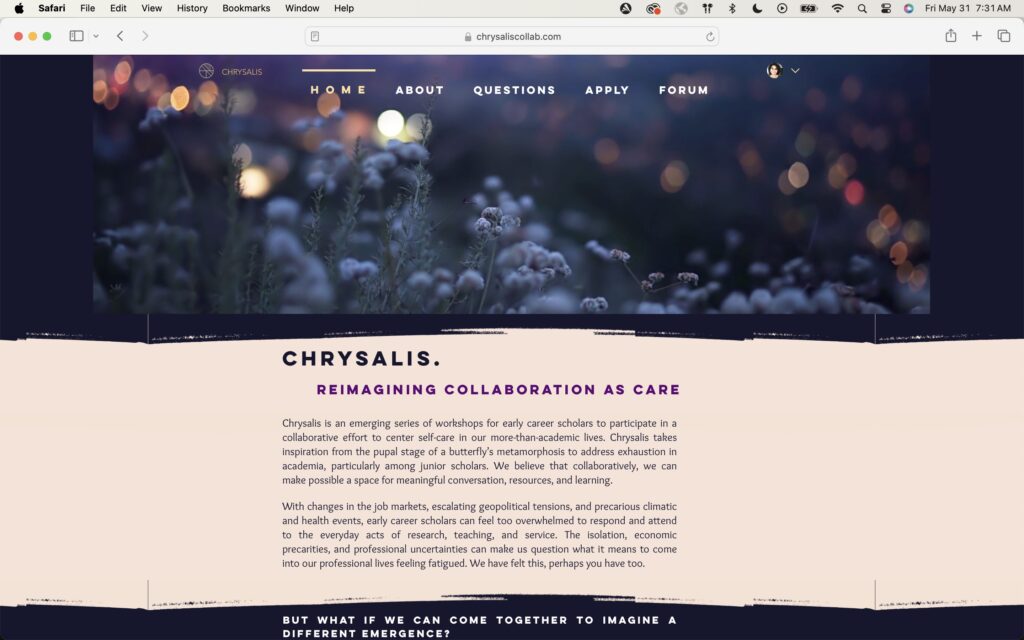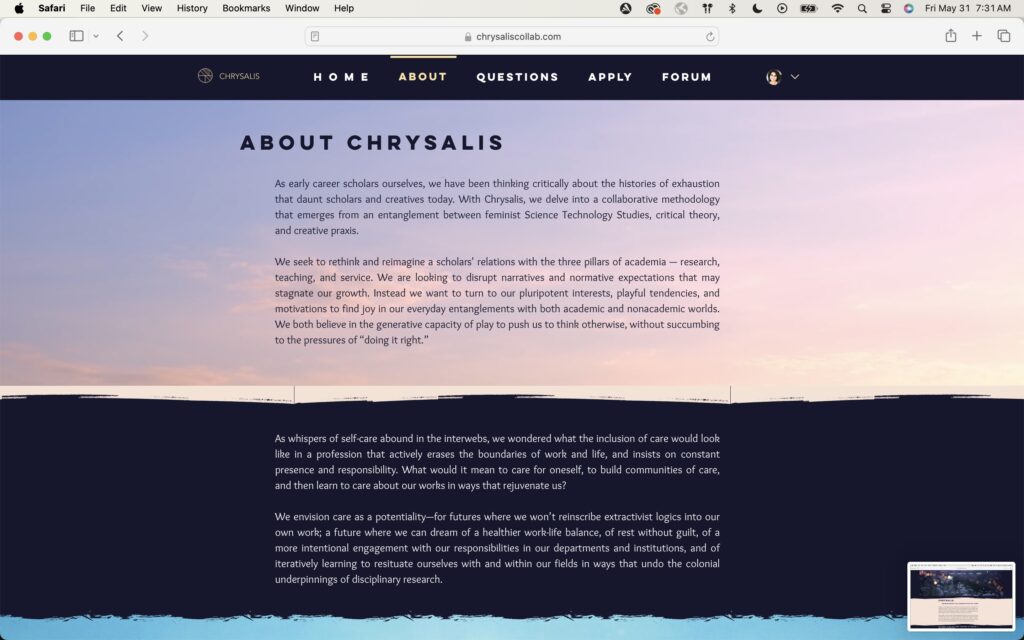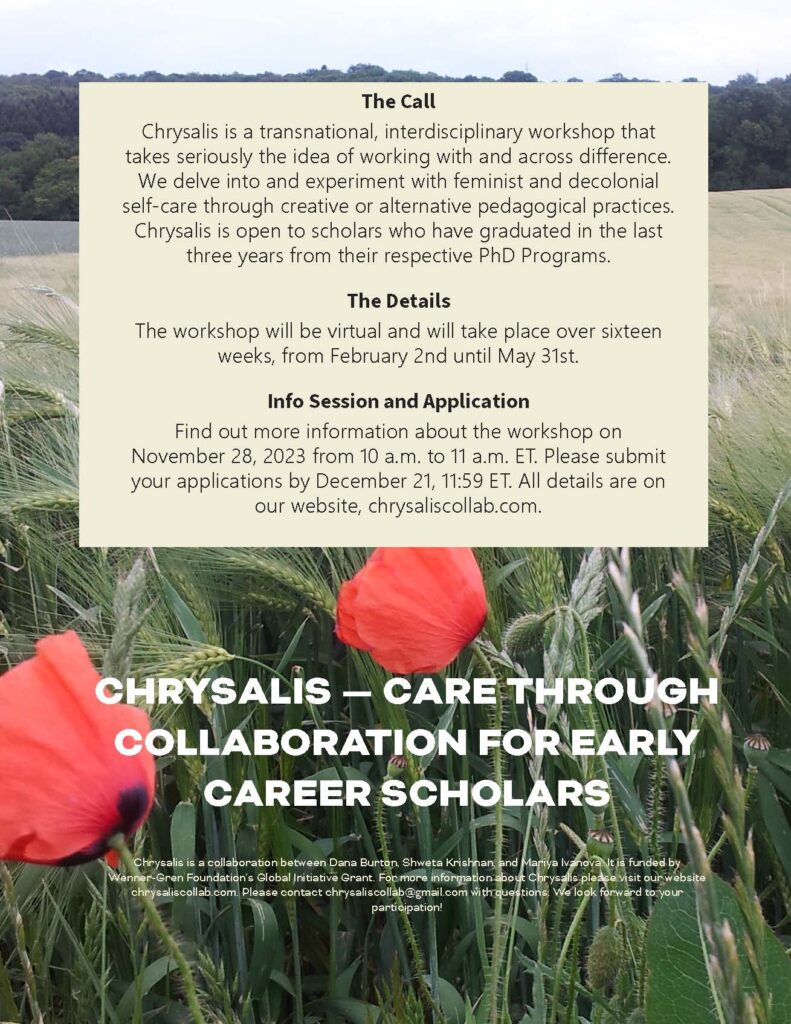Global Initiatives Grant Report – Collaboration as Care: Empowering Anthropologists in their Ethical Responsibilities
Chrysalis: Collaboration as Care devised strategies to address the exhaustion that early career scholars feel amidst recent geopolitical and environmental events, the global pandemic, and the planetary effects of climate change. Chrysalis took inspiration from the pupal stage of a butterfly’s metamorphosis. We envisioned a transnational space in which we could build self-care and response-ablity into research, teaching, service by learning to collaborate with each other. We asked what it would mean to emerge differently from the cocoon of our doctoral programs.
We implemented the grant between October 2023 and June 2024, dividing our labor into a planning phase in Fall 2023 (October -December 2023), an implementation phase in Spring 2024 (January – May 2024), and a post-programmatic analytical phase in June 2024. We thank the Wenner-Gren Foundation for supporting our initiative.
Fall 2023:
The planning phase began by creating a broad framework for collaboration through selfcare. We examined sources in anthropology, feminist and queer studies, critical race studies, postcolonial, decolonial, transnational studies to understand how colonial/postcolonial, as well as neoliberalist restructuring of the university and job market, regional divisions, and area studies have contributed to the valorization of individual labor, and ultimately to the isolation and exhaustion of the individual academic. We were inspired by their calls for radical imaginations, which we wove into our conceptions of self-care and collaboration as a way to transform the three pillars of academic work– research, teaching, and service.
To implement this, we designed a website together with a web designer Mariya Ivanova, a longstanding collaborator (see Image 1 and 2). Following this, we created an application, circulated the call amongst our networks, and logistically planned the four months of activities.


By mid-January, we had selected our first cohort of 35 participants, consisting of scholars from the US, Canada, UK, EU, South Africa, Columbia, Chile, India, Singapore, and Australia.
Spring 2024:
Chrysalis launched its activities on February 2nd, during our opening ceremony. Every month, under a particular theme, we conducted the following activities: 1) reflective prompts for participants to engage critically and in an embodied manner 2) 2-3 guest speakers 3) team-building exercises 4) open hours. As a virtual workshop, the success of Chrysalis depended on creating safe spaces. We did this through posting-password protected forums where the participants could converse with each other openly and freely.
February: Our Baseline and the Strategies we Reach For
Our goal was to explore embodiment of exhaustion and to create strategies for exploring radical self-care. Our speakers were Jennifer Harge (Detroit) and Fikile Nxumalo (Toronto). The team-building exercise engaged further with place-based ways of conceptualizing our relationship with research, pedagogy, service, and the open hour provided further space for engaging with exhaustion/isolation.
March: Work/Life Balance Recognizing Where and When We Get Stuck.
Our motivation came from our belief that it is impossible to make changes in our lives if we don’t acknowledge the root of where the problem is, or how it is affecting us. We don’t expect to “fix” the problem—oftentimes it is systemic, and beyond our power to change. Rather, by drawing attention to ourselves when we become paralyzed by fear, anger, frustration, confusion, we have a chance to acknowledge its impact and make steps to address our reactions to it. The speakers were Mamela Nyamza (South Africa) and Angela Okune (California). Team building and open hours saw us cultivating small strategies to shift challenges as well as reflecting on the power in staying true to our dreams.
April: Exploring Public-facing Initiatives & How we are Re-aligning our Interests
Our goal was to explore our response-ability to events unfurling around us, and to build strategies for collaboratively engaging with communities outside our scholarly networks. Speakers were Christopher Combemale (New York) and Riya Roy (Calcultta). The team-building exercise provided opportunities to create list poetry together, and open hours provided opportunities to discuss on-campus protests and our role as scholars in fostering care for students.
May: Bridging our Works & Becoming Passion-Forward
Our aim was to be aspirational, and let our creative works and leanings be inspiration for our academic professions. Our speakers were Maisam Alomar, Deepti Misri, and Leila Gomez (Colorado) who shared with us their experiences of what collaboration looks like beyond academic spaces, and how care is not separate from community work. This conversation was particularly important in the context of the ongoing genocides around the world. Team building and open hours were spaces to concept map future goals in academia and also how we want to our work to matter beyond the classroom.
Lessons Learned and Future Directions:
The biggest challenge we faced was negotiating time differences. To allow participants some freedom, we conducted team-building and open-hours twice and at different times each during March and April. We also tried to vary the time of our Speaker Schedule between morning and evening, and posted recordings of the sessions for asynchronous engagement.
Our greatest success was the connections forged between participants. By creating a safe space to be in community, to be held and to be vulnerable with each other, we provided a way to relate beyond the singular events of our everyday lives. We effectively encouraged each other to let go of any embarrassments that were stifling our ability to express ourselves. Simultaneously, we were practicing being in good relations with each other. In so doing, we provided meaningful methods to address challenges in our research, teaching, and service. Additionally, we engaged in deep reflections to fruitfully discuss barriers (both personal and professional) to our mobility within academia that allowed for us to be inspired by others’ efforts to incorporate care through attention to ourselves and through community building.
Going forward, Chrysalis will shift to a Google Forum to support the alumni with seasonal prompts, open hours, resource sharing, and collaborative opportunities. We intend to continue developing the pilot program we implemented with the Wenner-Gren grant into a more sustainable, long-term effort by applying to long-action grants, as well as building small workshops that can be conducted in conference spaces and other annual scholarly meetings.
